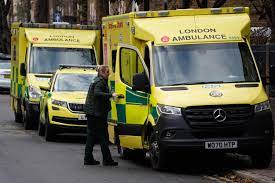By Charlie Carmichael-
Ambulance staff in five areas of England are to stage two further strikes in January, union leaders say.
The industrial action on 11 and 23 January will put emergency care under serious strain.
The strike action will involve staff employed by London, Yorkshire, North West, North East and South West ambulance services.
It comes after 25,000 ambulance workers from Unison, Unite and the GMB unions walked out in coordinated strike action on 21 December – their biggest strike in 30 years.
Members of the GMB union at nine ambulance trusts are also preparing to strike on 28 December, while 1,000 union members in the Welsh Ambulance Service are set to announce strike dates in the new year.
Wednesday’s strikes took place after last-ditch crisis talks between Health Secretary Steve Barclay and unions failed to address the issue of pay.
About 600 members of the army, navy and RAF were drafted in from across the country to help during this week’s walkouts.
The majority of ambulance trusts in England declared critical incidents this week – meaning they were on their highest level of alert, fearing they could not provide usual critical services.
Health Secretary Steve Barclay said further strike action was in no one’s best interest.
Unison leaders say the action is a direct result of the government’s refusal to negotiate over pay.
Life-threatening calls to 999, as well as the most serious emergency calls, will still be responded to, they say.
Services in London, Yorkshire, the North West, North East and South West will take action over pay and staffing.
The January strikes will each last for 24 hours from midnight, Unison says, and will involve all ambulance employees – not just 999 response crews.
Ambulance staff, including paramedics, call handlers and technicians, staged a strike in England and Wales on Wednesday, and are set to strike again on 28 December.
Three unions – Unison, Unite and the GMB union – were involved in the strike action.
“We are disappointed that some union members have chosen to take further strike action,” said Mr Barclay.
He said the pay demands the unions were making “would mean taking money away from frontline services and cause further delays to treatment” and called for further strikes to be reconsidered.
Why are nurses and ambulance staff striking?
Even before Wednesday’s strike, a quarter of ambulances were delayed for more than an hour outside A&E, according to the latest NHS England statistics.
Saffron Cordery, interim chief executive of NHS Providers, which represents trusts in England, said the prospect of prolonged strikes by more health unions in January was “incredibly worrying”.
“There are no winners in this situation. Serious talks must take place between health ministers and unions, and fast.”
Unison general secretary Christina McAnea said no health workers wanted to go out on strike but holding talks was the only way the dispute would end.
She said accusing NHS staff of making a conscious decision to inflict harm on the public by taking action this week “was not the health secretary’s finest hour”.
“Neither was it a particularly smart move for Steve Barclay to falsely accuse health unions of failing to deliver a national emergency cover plan,” she added.
“It’s time [he] stopped with the insults and fibs and called the unions in for proper talks about improving NHS pay.”
The health secretary has repeatedly said that ambulance workers have already been given a pay rise recommended by an independent pay review body and that any further increase was unaffordable.
Mr Barclay is hoping to settle next year’s pay deal for NHS staff in England, from April 2023, but the unions say strikes are about this year’s pay offer, which he is refusing to negotiate on.

